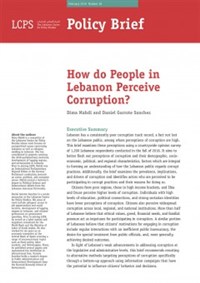How do People in Lebanon Perceive Corruption?
- Dima Mahdi, Daniel Garrote Sánchez

Lebanon has a consistently poor corruption track record, a fact not lost on the Lebanese public, among whom perceptions of corruption are high. This brief examines these perceptions using a countrywide opinion survey of 1,200 Lebanese respondents conducted in the fall of 2018. It aims to better flesh out perceptions of corruption and their demographic, socioeconomic, political, and regional characteristics, factors which are integral to forming an understanding of how the Lebanese public regards corrupt practices. Additionally, the brief examines the prevalence, implications, and drivers of corruption and identifies actors who are perceived to be participating in corrupt practices and their reasons for doing so.
Citizens from poor regions, those in high income brackets, and Shia and Druze perceive higher levels of corruption. Individuals with high levels of education, political connections, and strong sectarian identities have lower perceptions of corruption. Citizens also perceive widespread corruption across local, regional, and national institutions. More than half of Lebanese believe that ethical values, greed, financial needs, and familial pressure act as impetuses for participating in corruption. A similar portion of Lebanese believe that citizens’ motivations for engaging in corruption include regular interactions with an inefficient public bureaucracy, the desire for special treatment from public officials, and, more generally, achieving desired outcomes.
In light of Lebanon's weak advancements in addressing corruption at the legislative and administrative levels, this brief recommends resorting to alternative methods targeting perceptions of corruption specifically through a bottom-up approach using information campaigns that have the potential to influence citizens’ behavior and decisions.
Dima Mahdi
is a former researcher at the Lebanese Center for Policy Studies whose
work focuses on socio-political issues concerning Lebanese, as well as
refugees residing in Lebanon. She has conducted and contributed to
research covering the lessons learned and ways forward for Syrian refugees’
protracted displacement in Lebanon; the political environment regarding
the presence of Syrian refugees in Lebanon and the increased calls for their
return to Syria; coping mechanisms of Syrian refugees and local communities;
perceptions of corruption in the Lebanese public sector; and the development
of lagging regions by examining institutional, economic, and social stability
factors. She is currently enrolled in a master’s program in Conflict Resolution
and Governance at the University of Amsterdam and holds a BA in Political
Science and International Affairs from the Lebanese American University.
Daniel Garrote Sánchez
contributed to this project while being a senior researcher
at the Lebanese Center for Policy Studies. He currently works as a labor market
consultant at the World Bank. His areas of work include economic migration,
labor markets and the task content of jobs, conflict and forced displacement,
and development of lagging regions. Prior to joining LCPS, he served as a
labor migration consultant for the World Bank and the Ministry of Labor of
Saudi Arabia. He also worked for six years as an economic researcher at the
Central Bank of Spain covering a range of macroeconomic topics such as fiscal
policy, labor markets, and deleveraging. Garrote Sánchez holds a master’s
degree in Public Administration and International Development from the
Harvard Kennedy School of Government.
 Lebanon has a consistently poor corruption track record, a fact not lost on the Lebanese public, among whom perceptions of corruption are high. This brief examines these perceptions using a countrywide opinion survey of 1,200 Lebanese respondents conducted in the fall of 2018. It aims to better flesh out perceptions of corruption and their demographic, socioeconomic, political, and regional characteristics, factors which are integral to forming an understanding of how the Lebanese public regards corrupt practices. Additionally, the brief examines the prevalence, implications, and drivers of corruption and identifies actors who are perceived to be participating in corrupt practices and their reasons for doing so.
Lebanon has a consistently poor corruption track record, a fact not lost on the Lebanese public, among whom perceptions of corruption are high. This brief examines these perceptions using a countrywide opinion survey of 1,200 Lebanese respondents conducted in the fall of 2018. It aims to better flesh out perceptions of corruption and their demographic, socioeconomic, political, and regional characteristics, factors which are integral to forming an understanding of how the Lebanese public regards corrupt practices. Additionally, the brief examines the prevalence, implications, and drivers of corruption and identifies actors who are perceived to be participating in corrupt practices and their reasons for doing so.